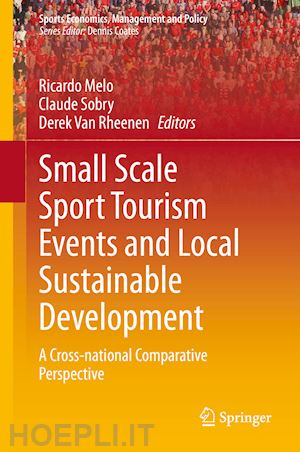
Questo prodotto usufruisce delle SPEDIZIONI GRATIS
selezionando l'opzione Corriere Veloce in fase di ordine.
Pagabile anche con Carta della cultura giovani e del merito, 18App Bonus Cultura e Carta del Docente
This book outlines the impacts of small scale sport tourism events on local sustainable development in different countries. Using half marathons organized in small and medium sized cities as an example, the chapters are robust case studies, applying a unified methodology in order to provide a clear overview of the sport tourism system in each country.
The book begins with a description of the methodologies used and an overview of the countries studied. The country chapters focus on several dimensions of sport tourism in each city, including but not limited to the history of past sport tourism events in the municipality, the characteristics of the city hosting the event, the demographic profile of participants in the event, and the quantifiable economic, environmental, and sociocultural impacts of the event. Each chapter concludes with analysis and policy recommendations for holding future events that contribute to local sustainable development. The book concludes by summarizing and comparing the main results across different countries, and presenting main conclusions and overarching recommendations.
Written by international experts in sports tourism, this book is geared towards academic researchers and students, interested in sport tourism, sports economics, management, and sustainable development, as well as policy makers and professionals tasked with bringing such events to their cities.
Chapter 1: Running Tourism and the Global Rise of Small-Scale Sport Tourism Events.- Chapter 2: Sport Tourism Events and Sustainable Local Development - An Overview.- Chapter 3: Defining a Methodology for a Cross-national Comparative Study.- Chapter 4: Algeria: Economic, social and environmental aspects of a road race on a city half marathon. Bejaïa case study.- Chapter 5: Brasil: The impact of small-scale sport tourism events. The case of the 21K Guarujá 2016.- Chapter 6: Czech Republic: Sport tourism development – between tradition and new trends.- Chapter 7: France: The socioeconomic impact of a half marathon. The case of Phalempin as part of an international study.- Chapter 8: Hungary: The socioeconomic impact of urban running events on local and regional development in Debrecen.- Chapter 9: Italy: Sport tourism events. The case of the Rome-Ostia half marathon.- Chapter 10: Portugal: Small-scale sport tourism events and local sustainable development. The case of the III Running Wonders Coimbra.- Chapter 11: Romania: Bucharest international marathon-the impact of a half marathon race from an environmental, economic and socio-cultural perspective.- Chapter 12.- Switzerland: Small-scale sport tourism events and local sustainable development. The case of the 12 and 24km of the Vallée De Joux-the Tour du Lac.- Chapter 13: Current trens in small scale sport tourism events and sustainable local development: A comparative approach.- Index.
Ricardo Melo is a Professor at the Coimbra Education School, Polytechnic Institute of Coimbra, Portugal. His current academic interests are nature sports, sustainable local development, and the impacts of sport tourism events. He is a Vice President of the International Research Network In Sport Tourism (IRNIST).
Claude Sobry is Professor Emeritus at the University of Lille 2, France. He has published widely in the areas of macroeconomics, sport economics, sport governance and sport tourism. He is the founder and President of the International Research Network In Sport Tourism (IRNIST).
Derek Van Rheenen is the Executive Director of the UC Berkeley Athletic Study Center. He earned his Ph.D (1997) in Cultural Studies, his Master’s degree (1993) in Education, and his undergraduate degree in Political Economy/German (1986), all from U.C. Berkeley (US). He coordinates the Cultural Studies of Sport in Education (CSSE) M.A. Program inthe Graduate School of Education. He is a Vice President of the International Research Network In Sport Tourism (IRNIST).











Il sito utilizza cookie ed altri strumenti di tracciamento che raccolgono informazioni dal dispositivo dell’utente. Oltre ai cookie tecnici ed analitici aggregati, strettamente necessari per il funzionamento di questo sito web, previo consenso dell’utente possono essere installati cookie di profilazione e marketing e cookie dei social media. Cliccando su “Accetto tutti i cookie” saranno attivate tutte le categorie di cookie. Per accettare solo deterninate categorie di cookie, cliccare invece su “Impostazioni cookie”. Chiudendo il banner o continuando a navigare saranno installati solo cookie tecnici. Per maggiori dettagli, consultare la Cookie Policy.